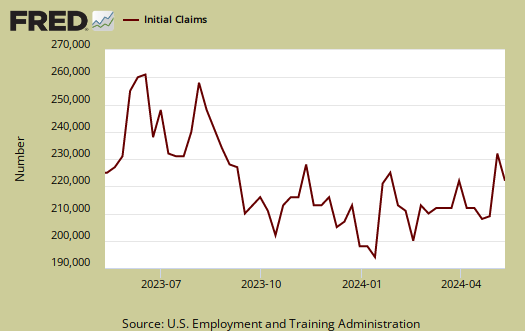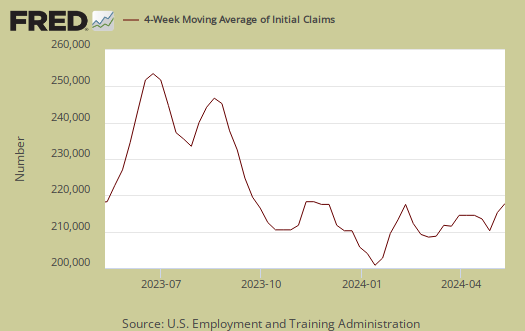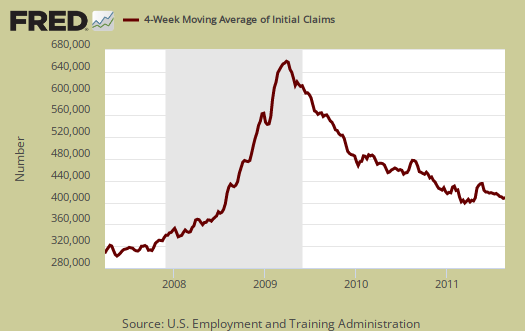Initial weekly unemployment claims for week of August 20th were 417,000, an increase of 5,000. The previous week was revised up 4,000, from 408,000 to 412,000.

The DOL is implying the Verizon strike, where workers went back in defeat, without a better contract, but supposedly now in serious negotiations. These striking workers claims potentially distorted the initial claims numbers of the last two weeks. From the DOL press release:
Special Factor: As a result of a labor dispute between Communications Workers of America and Verizon Communications, at least 12,500 initial claims were filed in the week ending 8/13/2011 and at least 8,500 initial claims were filed in the week ending 8/20/2011.
Assuming all of the striking Verizon workers' claims are invalid, assuming all are back at work, slaving away, one needs to subtract off this number from the not-seasonally adjusted data. Not seasonally adjusted initial claims were:
The advance number of actual initial claims under state programs, unadjusted, totaled 341,436 in the week ending August 20, a decrease of 4,536 from the previous week. There were 384,955 initial claims in the comparable week in 2010.
If we subtract off the striking worker's claims, then the not seasonally adjusted initial claims would have been 332,936. That said, the weekly seasonal adjustment algorithm for initial claims doesn't seem to be easily obtained, so doing a very, very rough guess on this week's adjustment, let's say the not seasonally adjusted data equates to 80% of the seasonally adjusted data and let's apply that ratio to the Verizon strike workers. That would make our fudged seasonal adjustment 6786. In other words, this week's initial claims would then be 410,213 and bottom line, still above 400,000.
You maybe wondering how striking workers could be counted as unemployed. The rules of allowing workers to claim unemployment insurance when on lock out or strike varies across states. New York, in particular, allow workers on strike to file for unemployment. Additionally, Verizon has been known to play dirty pool. We don't know how many of those striking workers were actually fired and thus will continue to want unemployment insurance benefits.
The magic number to show job creation is at minimum, below 400,000 initial unemployment claims, per week. Most Economists will quote 375,000 as the magic number to indicate job growth.
Below is the mathematical log of initial weekly unemployment claims, so one can get a better sense of the rise and fall of the numbers. A log helps remove some statistical noise, it's kind of an averaging. As we can see we have a step rise during the height of the recession, but then a leveling, not a similar decline.... Every week initial unemployment insurance claims hover around 400,000, refusing to really drop, a never ending labor malaise for most of the time after the recession ended in July 2009.

Below is the 4 week moving average, set to a logarithmic scale to remove even more statistical noise, for the last year. Again, we need the 4 week moving average to stay below 400,000 and keep dropping. Numerous economists say the number is 375,000 to show any job growth.

Below is the 4 week moving average, set to a log scale, from April 1st, 2007. We are nowhere near pre-recession initial weekly unemployment claims levels.

The insanity of Wall Street reacting to this report is true herd behavior. Weekly initial unemployment claims are statistically noisy, the numbers are always revised and only through a long term pattern can one say anything about the unemployment situation.
Continuing unemployment claims dropped but bear in mind people can plain being running out of benefits.
The advance seasonally adjusted insured unemployment rate was 2.9 percent for the week ending August 13, a 0.1 percentage point decrease from the prior week's revised rate of 3.0 percent.
The advance number for seasonally adjusted insured unemployment during the week ending August 13 was 3,641,000, a decrease of 80,000 from the preceding week's revised level of 3,721,250. The 4-week moving average was 3,701,000, a decrease of 19,500 from the preceding week's revised average of 3,720,750.
In the week ending August 6th, not seasonally adjusted, the raw number was 7,290,189 official people obtaining some sort of unemployment insurance benefit. Officially, there are 13.9 million unemployed and if one takes all of the people who want a job, including those stuck in part-time because they can't get anything else, the number is 29 million.

Impact of Verizon Strike on Unemployment Claims
As someone who worked for Verizon and lived through 4 strikes let me just say that "where workers went back in defeat" is an inaccurate statement. They went back while negotiations continue. They can always come back out again if negotiations fail. This is not the first time that this has happened. The fact that they went back at all only means that both sides were feeling the negative effects.
You really need to be more precise in your reporting.
I stopped reading after that statement since it so very obvious that whoever wrote this has no insight into Verizon and the labor practices there. I don't think I'll be inclined to lend any credence to your publication going forward.
Verizon workers defeat and precision
Well, one thing is certain, your opinion is just that. The end of the strike without a new contract or negotiated terms is perceived as failure by many in labor and in the press. When the strike ending, the defeat was headline news, as keyword defeat. Writing a minor comment is not inaccurate reporting and more to the point, this post is about initial unemployment claims and it's implications for the current and September unemployment rate.
Not only is the data accurate, if one notes the point of mentioning Verizon is to determine what initial claims would be w/o the striking workers claims.
This article is not on collective bargaining, unions, negotiations and debate on what defines defeat.
The article is on initial unemployment claims, data and correlation to overall unemployment and economic malaise on a macro level. It also is about Wall street traders reacting to this weekly report as being quite invalid as a major macro economic indicator or even an employment indicator. There is way too much noise in this data metric for that. EOM.
Obviously comments do not have to be accurate and objective by the fact yours was allowed.
"negotiations continue"
Okay, "negotiations continue" ... then maybe register and post more accurately about those negotiations.
EP followers like myself, we actually like information. Robert Oak can't get enough of it.
So, if you want more precise reporting on Verizon vs. union, post away! People will actually read your comments carefully.
Idiots
Wow!!! Your information on unemployment may be correct. I'm not sure, I don't follow those statistics. But I do know that you obviously know nothing about what our strike was about. So let me inform you, although you probably don't care. We went on strike because Verizon was not negotiating with us. At all!!! We said that when they decided to negotiate fairly with us we would go back to work. So our going back to work was in victory, goal accomplished.
So if you want to be good at what you are trying to do. Do not make blind statements, or regurgitate statements which were made blindly.
Good day Mr. Uninformed
D.Dubbs
D. Dubbs you need to chill out
This site is probably one of the most labor friendly economics sites out on the Internets that is not actually owned and run by the AFL-CIO, SEIU or corresponding unions. We talk about offshore outsourcing all of the time, trade, middle class you name it and we assuredly slammed Wisconsin, but all on our own.
So, you need to chill and take your rage out on Verizon and raise hell there about their offshore outsourcing/ H-1B, union busting agendas.
We are a news source and as such take it very seriously to be accurate on statistics data but there is nothing implied in this offhand comment in mentioning initial unemployment claims that is anti-labor here.